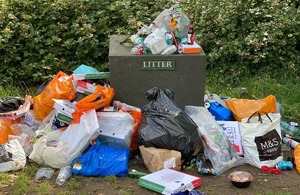
On-the spot fines for litter, graffiti and fly-tipping are set to rise as part of a crackdown on anti-social behaviour, Environment Minister Rebecca Pow announced today (Friday 7 July), delivering on the Prime Minister’s Action Plan to clamp down on these crimes and build stronger communities.
Environmental crimes like littering and fly-tipping are cynical and opportunistic, damaging wildlife and nature, creating eyesores and ruining our enjoyment of the great outdoors. The new upper limit to fines will deter people from harming our public spaces in the first place, and ensure that those who continue to offend face tougher consequences.
To help equip councils with everything they need and strengthen their arm, government is laying a statutory instrument increasing the upper limits for various fixed penalty notices (FPNs) on Monday 10 July. This means:
- The maximum amount those caught fly-tipping could be fined will increase from £400 to £1,000
- The maximum amount those who litter or graffiti could be fined will increase from £150 to £500
- The maximum amount those who breach their household waste duty of care could be fined will increase from £400 to £600
Environment Secretary, Thérèse Coffey said:
Everyone loathes litter louts and people who dump rubbish. We are increasing the penalties local councils can apply for this behaviour that spoils our streets and harms nature.
Environment Minister Rebecca Pow said:
We’re taking action right across government to crack down on anti-social behaviour and ensure waste criminals face justice – but it’s vital that communities have the tools they need to address the problem as well.
That’s why we are supporting local authorities by increasing the upper limit for on-the-spot fines and ringfencing the proceeds for clean-up and enforcement operations.
In addition to increasing the upper limit on fines, last week, the government launched a consultation on ringfencing the receipts from FPNs for litter and fly-tipping to fund local authorities’ enforcement and clean-up activities, such as spending the money raised from fining criminals on further enforcement officers. This would see the money paid by criminals go directly back into repairing the damage from their crimes, or into enforcement efforts to prevent similar incidents from happening again.
The consultation seeks to understand more about how FPN receipts are currently spent and what the impacts of restricting the spending of these receipts to a set list of enforcement and clean-up functions would be.
The government wants councils to take a much tougher approach to this type of anti-social behaviour. Taking proportionate and effective enforcement action against people who intentionally or carelessly damage their environment is a practical step local authorities can take to change behaviour and deter others from offending.
Our enforcement guidance, as part of the Code of Practice on Litter and Refuse, advises on best practice for litter enforcement from local authorities. The guidance makes clear that in no circumstances should enforcement activity be considered a means to raise revenue. New powers under the Environment Act 2021 will allow us to ensure that enforcement powers are used with a high degree of professionalism, whether by council staff or private contractors, and to place this enforcement guidance on a firm statutory footing.
In 2021/22, councils dealt with almost 1.1 million incidents of fly-tipping and issued 91,000 fines, along with other enforcement actions.
Local authorities will have the freedom to set the rates that offenders should pay, within the limits above.
Today’s announcement marks the latest step in the delivery of the Prime Minister’s Anti-Social Behaviour Action Plan and comes during national ASB Awareness Week, run by Resolve and now in its third year, which runs from 3-9 July.
Earlier this week the Department for Culture, Media and Sport launched applications for the Million Hours Fund, which will enable the equivalent of more than 200 youth clubs to open their doors for an extra night each week in anti-social behaviour hotspots, to make sure young people are supported away from bad life choices and given the opportunities they need to thrive.
We have also announced that more than 50 councils across the UK are to benefit from funding of £1.2 million from the Chewing Gum Task Force to remove discarded chewing gum from our streets and prevent it from being littered in the first place.
And the Home Office has launched pilots of ‘hotspot’ policing – increasing police presence in areas with high levels of anti-social behaviour – and the ‘Immediate Justice’ scheme, which sees those found engaging in anti-social behaviour made to repair the damage they inflicted on victims and communities, with an ambition for them to start work as soon as 48 hours after their offence so victims know anti-social behaviour is treated seriously and with urgency.
The Anti-Social Behaviour Taskforce met yesterday (6 July), and was chaired by the Home Secretary Suella Braverman and attended by the Secretary of State for Levelling Up, Housing and Communities Michael Gove. The taskforce met to discuss anti-social behaviour and restoring pride in place in communities. The meeting brought together Ministers and national and local partners, including Police and Crime Commissioners to discuss the positive progress to date.
The higher fines to crack down on littering and fly tipping comes alongside Defra’s wider work to tackle waste crime and take the fight to offenders.
In April, grants totalling £775,000 will help councils roll out a range of projects to crack down on fly-tipping were announced. Twenty-one local authorities will benefit from the grants, with schemes including roadside CCTV and social media campaigns in Plymouth and targeted surveillance at hotspot areas in Pendle.
Defra has also announced that fees for disposing of household DIY waste at recycling centres will be abolished – helping people to deal with their waste responsibly and removing a financial burden that gets in the way of people dealing with their waste responsibly.
- These changes will come into force 21 days after the laying of the Statutory Instrument, on 31 July 2023.









